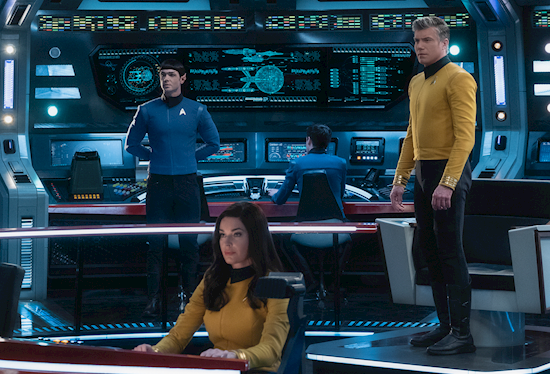Judge's 'Star Trek' ruling goes 'where no court has gone before' in copyright lawsuit
An appeals court took some literary license when discussing a copyright lawsuit over the beloved science fiction series "Star Trek."
Judge Denny Chin of the 2nd U.S. Circuit Court of Appeals borrowed some iconic language from the show's opening while issuing a decision on a case between CBS Broadcasting Inc. and a videogame developer who claims "Star Trek: Discovery" borrowed a concept he came up with. Chin noted that a copyright lawsuit filed in 2018 was one among many since “Star Trek" premiered in September 1966.
“Today, in the latest round of Star Trek-related litigation, we are asked to boldly go where no court has gone before," Chin wrote for a panel of three appeals judges who decided the case consistent with the findings of a lower-court judge.
‘STAR TREK’ SPINOFF SERIES FOCUSED ON A YOUNG SPOCK ORDERED AT CBS ALL ACCESS
He said the panel decided that Anas Abdin failed to show there was substantial similarity between his videogame concept and the television series.
Abdin maintained that a concept he introduced online in 2014 on several online forums and websites later was utilized after CBS Broadcasting Inc. and Netflex Inc. premiered the latest “Star Trek" incarnation in September 2017.
MYSTERIOUS 'STAR TREK LOGO' SPOTTED ON MARS BY NASA
Abdin's videogame and the television series both featured tardigrades, which are microscopic organisms so hardy that they can survive in space, the 2nd Circuit said.
The appeals court noted that information about tardigrades was available publicly. It cited a Smithsonian Magazine report that tardigrades commonly seen on moss or the bottom of lakes have also been found surviving in boiling hot springs and buried under ice on Himalayan mountaintops.
CLICK HERE TO GET THE FOX NEWS APP
“The tardigrade’s ability to survive in space has been reported and discussed in numerous scientific studies and thus has entered the public domain as a scientific fact," the appeals court said, noting that they've also been featured in works of fiction. “Facts and ideas are not protected by copyright."
The Associated Press contributed to this report.
Source: www.foxnews.com

